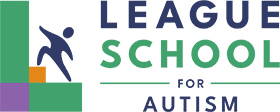Insights from IEP Improvement Project Drive Adoption of Other Initiatives
As reported in March, the Department of Elementary and Secondary Education (DESE) selected the League School as one of three private schools, and the only school focused on the autism community, to help overhaul the Individual Education Program (IEP) process. The goal of the initiative is to improve outcomes for students with disabilities. “Last month, a state liaison from the Center for Applied Special Technology came to evaluate our work on the IEP Improvement Project, and she was very complimentary,” said the school’s educational consultant, Dr. Margaret Reed. “Thanks to the commitment and dedication of our staff, the school has been nimble as the project has evolved.”

Across the state, fewer than 50% of families take part in IEP meetings. In contrast, the League School has high parent and student involvement, and gets the family involved early in the process. The state may ask the school to pilot a new IEP form.
Over the summer, League School evaluated 2020 IEP Improvement Project data that revealed opportunities for improvements. The first was the need to improve staff diversity that can better serve students with a variety of ethnic and cultural backgrounds. In response, the school established a Diversity Council that’s composed of teachers, staff, and administrators who are gathering speakers and resources to begin addressing this need.
The data also revealed interest in a parent support group. Beginning last month with the inaugural meeting, parents now have a forum for sharing experiences and suggestions. “The IEP Improvement Project will continue into next year, and we didn’t want to wait to start these two important initiatives,” said Margaret.
The next focus of the IEP Improvement Project is to determine how to streamline data collection necessary for measuring academic gains without placing a burden on classroom staff. There are two electronic modules embedded in the classroom for this purpose. “A consistent form of data collection will allow us to measure a student’s academic process and independence,” said Margaret. “League School’s SCERTS educational model develops behavioral and communication skills and improving the IEP will help students navigate their disability and independence.”
